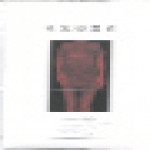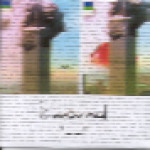Thursday, April 18, 2024
Browse by Genre
Industrial Music / Industrial Metal / Aggro Industrial / Electro Metal
Industrial Noise / Power Noise / Harsh Noise
Synth Pop / Electro Pop / Synth-Electronica
Techno / Trance / Goa / Drum'n'Bass / Jungle / Tribal / Trip-Hop
Ambient / Electronica / Ethereal / Dub / Soundscapes / Abstract
Experimental / Avantgarde / Weird & Wired / Glitch / Noise / Field Recording
Dark / Gothic / Wave / New Wave / Dark Wave / Industrial Gothic
New Music / Downtown / Avantgarde Jazz / New Classical / World
Search Reviews
Music Reviews
AXONE: Casus Belli
Somnambulant Corpse/Death Aesthetics has been putting out some quality cd-r's and 3" cd-r's by newborn or more known projects, like Tugend, Bestia Centauri, Dead Reaven's Choir and Survival Unit, plus a good tribute compilation to H. P. Lovecraft. Axone's debut 3" ep (3 tracks, 19') is topped by this sentence: "Self-directed evolution is within our collective power. All that stands in our way is an obsolete ideology". "Manifest Destiny" is an ecstatic drone with manipulated vocal and instrumental (orchestral or hymn-like, I'd say) samples; quite ambient sounding and, much unlike the rest of the ep, even peaceful. "Psychogenetic Terror" changes the whole atmosphere with dark industrial thuds and clankings, a heavy distorted drone close to death industrial fields, sparse noises and even crickets (!) in the ending. "Casus Belli", my favourite track, merges a gloomy synth drone with death industrial rhythms, plus a menacing low-pitched voice; sort of a cross between Allerseelen and Brighter Dead Now. Good stuff for an ep, I'd like to hear him on a longer run.
I: WOUND: --
This is a CD-R limited to 50 copies, issued in the Verato Project series (other cds by Ovum, Eeyow Karoom - see archives -, Bernd Spring etc.) in november 2001 - I'm partly guilty of the delay in reviewing, apologies. I: Wound is a German sound artist who has worked for previous releases with ethnic field recordings, mainly from India. This concept release couldn't be more different: a 75' "soundscape of footage news on the World Trade Center and Pentagon attacks", that's it, 9-11 all the way. Recorded on the very same day and mixed two days later, the tracks are divided into two main sections, "The southern tower" and "The northern tower", and are basically overlayed recordings from live sounds, tv broadcasts, etc. If anything, it gives an idea of the confusion and the panic following the attacks, but also - and this is probably a fruit of the year which has passed - a portrait of the sickening media/political celebration of civilian death, the enormous quantity of words shed for a terrorist attack against the holy temple of democracy, while there are hundreds of un-filmed and "secondary" wars all over the world no one ever talks about (let alone asking justice or reparation for them). Slavoj Zizek writes in the liner notes: "the ultimate truth of the capitalist utilitarian de-spiritualized universe is the de-materialization of the 'real life' itself, its reversal into a spectral show". I think it sums it up quite well.
Paolo Di Cioccio: Logos
I haven't heard from Paolo Di Cioccio since his great album "Images" (at least a couple of years ago, I'd say) but now theis contemporary Italian composer and master of Theremin ceremonies (you might know him from his work with Theatrum Chemicum) is back with a new work of love (which by the way comes as a really beautiful white digipack with blurred images in primary colors that perfectly match the disc's contents).
"Logos" (the highest form of knowledge in Greek philosophy) is an awesome concentration of cosmic electronics, classical elegance, esoteric atmospheres. The interaction of Theremin with his other primary instrument of choice, the oboe, present us with estranged sonic images of timeless beauty. Graced by soft rhythm textures of 309 and warped by synthetic patterns of moog, mellotronium and other vintage and non-vintage gear, Paolo Di Cioccio's music is a gateway to eternity and a voyage through time and space, closing the gap between ancient and modern and bridging Vangelis, Vidna Obmana, Artemiy Artemiev, Stockhausen and others in a unique time-bending and intimate research along a starry milky way leading to unknown places. You can hear his experience in scoring visual material reflect on his songwriting and the extreme visionary appeal that a record like this has only further enhances the evoking of images. In one song Di Ciccio even pushes the boundaries of his unique ambient/classical/cosmic electronic music stepping into a new dimension of Mego-ish minimalistic experimental techno made of up-tempo pounding beats, vanishing samples sparkling the tense atmosphere and traces of oboe floating around in the air with a nonchalance that stands opposite to the post-modern picture that the rhythmical repetition is drawing out. But that's just a brief parenthesis... By the time you get to the closing track, it'll be set back to tranquillity.
Paolo Di Cioccio: I Sing the Voice Electric - Theremin Recital
Artist: Paolo Di Cioccio
Title: I Sing the Voice Electric - Theremin Recital
Format: CD
Label: Videoradio (@)
Title: I Sing the Voice Electric - Theremin Recital
Format: CD
Label: Videoradio (@)
After "Logos" on Musica Maxima Magnetica records (cmp review on these pages) I find myself reviewing another Paolo Di Cioccio album that this times takes a more radical turn in a direction of experimental electronic and Theremin purism. Although the album "I Sing the Voice Electric - Theremin Recital" also features oboe and various electronic modulation in the form of synthesizers and processors, it is obviously a record focused around that beautiful Russian instrument called Theremin. For those who are unfamiliar with it, think of it as an electro-magnetic device with two antennas that produces sounds according to the position of the performer's hands in the air (they never actually touch the instrument). Di Ciccio's latest Theremin extravaganza has all the bells and whistles of a Theremin recital, from the classical vibrato sound that will reminisce you of old American UFO and sci-fi movies from the fifties to new experiments in unconventional sound design, from minimalist isolationism to ambience audiophilism. Although I like experimental avantgarde music I must say I definitely prefer Paolo's more "musical" side ("Logos" being a great example of his skills), even though I recognize the artistic value of a work that calls for a "new sound world" (like the CD's Italian-only liner notes by the author explain) and I value his effort in combining his new approach to the art of sound with his profound knowledge of music.
The CD cover has an illustration of the Twin Towers called "The Giants" (by Tonino Caputo), but the CD makes no further reference to NYC or any of last year's events.
Autopsia: Colonia
Artist: Autopsia (@)
Title: Colonia
Format: CD
Label: Staalplaat (@)
Distributor: Staalplaat (NL), Soleilmoon (US), Demos (It), These Records (UK), Target (De) and more...
Title: Colonia
Format: CD
Label: Staalplaat (@)
Distributor: Staalplaat (NL), Soleilmoon (US), Demos (It), These Records (UK), Target (De) and more...
In the mid nineties Autopsia (originally from ex-Yugoslavia, now exiled to Prague) gained some recognition through their personal re-interpretation of 19th century orchestral music and released several CDs on german label Hypnobeat (subsidiary of Hyperium). After thirteen years of music (Chain D.L.K. actually interviewed Autopsia a couple of years back - you may find the interview in the Archives section) and ten years away from Staalplaat, the very label who put out the debut 12" "The Knife" is releasing this collection of deleted takes that showcases their somber, martial and liturgical neoclassical style. Listening to "Colonia" and knowing that they are from Yugoslavia, I can't fail to make the Laibach connection, but they are not a Laibach clone at all (even though Autopsia too is very political, they are more classical, less military-like, and the use of vocals is drastically different, as in almost completely instrumental, with way less vocal parts and only occasionally using reading and recited parts instead). Another comparison that might help you locate the unusual genre played by Autopsia is Russian label Electroshock records and their neoclassical releases by Anatoly Pereslegin or by Artemiy Artemiev and his father Edward Artemiev (they too use grand brass and wood instruments ensembles, harpsi chord, timpani and drums, bells, strings orchestrations and the like, which pretty much is standard instrumentation on "Colonia"). "Colonia" is a concept album about death, «death as time, the age of its reign, death from perspective of faith that encompasses the totality of any being which is founded in metaphysical construct?» Autopsia declares to be less into music and more into «death and the pity of death; the music is in the pity?». «Autopsia creates images with which it nourishes that what it destroys?»(more about all of that in the booklet).



